Car Window Tinting Costs Explained | AutoTintPrices
Considering getting your car windows tinted? Understanding the cost of car window tinting is essential to make an informed decision. The price of window tinting can vary depending on multiple factors, such as the type of tint, the number of windows, and the warranties involved. In this article, we will break down the costs associated with car window tinting, providing you with valuable insights to help you plan your budget.
Key Takeaways
- The cost of car window tinting can range from $100 to $1,000, depending on various factors.
- Window tinting offers benefits such as UV protection, interior preservation, safety, privacy, comfort, and improved gas mileage.
- Factors affecting the cost of window tinting include the type of tint, warranties, number of windows, and installer experience.
- Choosing a reputable installer is crucial to ensure a high-quality finish and warranty.
- Factors influencing window tinting prices include the quality of tint, vehicle size, brand of film, shop overhead, and uniqueness of the vehicle.
Factors Affecting the Cost of Window Tinting
The cost of window tinting is influenced by several factors that can affect the overall price. Understanding these factors can help you make informed decisions when considering window tinting for your vehicle.
- Type of Vehicle: The type of vehicle you own can impact the cost of window tinting. Vehicles with fewer windows will generally cost less to tint compared to vehicles with more windows. Additionally, unique vehicles with special aspects, such as oversized windows or complex designs, may require additional time and effort, leading to increased prices.
- Tint Removal: If you already have existing tint on your windows that needs to be removed before applying new tint, the cost of removal can add to the overall expense. Tint removal involves labor and specialized tools, which can vary in cost depending on the complexity of the tint and the number of windows involved.
- Tint Material: The type and quality of tint material you choose will impact the cost. Different materials offer varying levels of performance, durability, and heat rejection. High-end materials such as ceramic tints tend to be more expensive compared to dyed or carbon-based tints.
- Installer Experience: The experience and expertise of the installer can affect the cost of window tinting. Highly skilled and reputable installers may charge higher prices for their services due to their expertise and track record of delivering high-quality results.
- Overhead Expenses: The overhead expenses of the tint shop, such as rent, utilities, and employee wages, can also influence the cost of window tinting. Tint shops with higher overhead expenses may need to charge more to cover their operational costs.
- Brand of Tint: The brand of tint you choose can also impact the cost. Established and well-known tint brands may be priced higher compared to lesser-known brands. However, higher-priced brands often come with a reputation for quality and performance.
Considering these factors and obtaining quotes from multiple installers can help you understand the cost breakdown and make an informed decision when planning to tint your car windows.
Car Window Tinting Costs for Different Vehicle Types
The cost of tinting car windows can vary based on the type of vehicle. The following table provides an overview of the average window tinting costs for different vehicle types:
| Vehicle Type | Tinting Package | Price Range |
|---|---|---|
| Coupes | Single Window | $69 |
| Sedans | Front Two Windows | $125 |
| All Sides and Rear Package + Front Windshield | $465 | |
| Trucks | Standard Cab | $185 |
| Crew or Extended Cab | $425 | |
| SUVs | All Sides and Rear Package + Front Windshield | $329 |
| Larger SUVs | $489 | |
| Tesla | Varies based on model and number of windows | Price range depends on the specific model and the number of windows to be tinted |
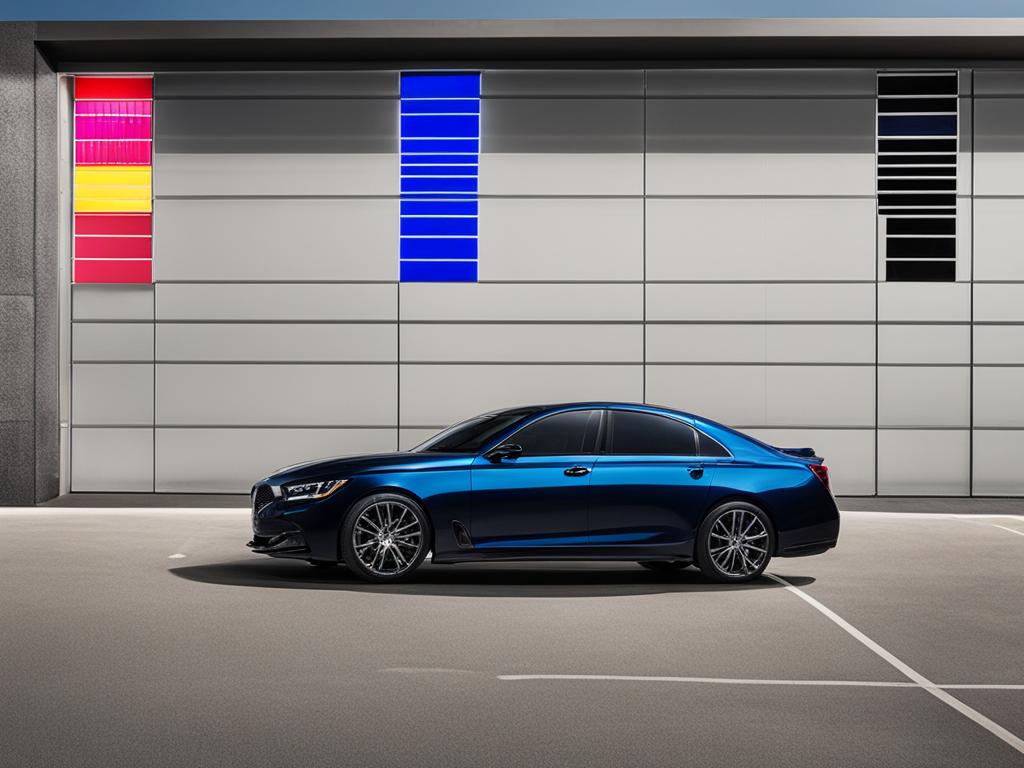
Importance of Choosing a Reputable Window Tint Installer
When it comes to getting your car windows tinted, choosing a reputable installer is of utmost importance. The skill and expertise of the installer can make all the difference in achieving a high-quality tint that meets your expectations. But why is it crucial to choose a reputable window tint installer? Let’s explore the key factors that should be considered.
Installer’s Experience
Experience plays a vital role in the window tinting process. An experienced installer has likely encountered various challenges and has honed their skills over time. They possess the necessary knowledge of different window types, tint materials, and application techniques, ensuring a seamless and professional installation. Their familiarity with potential issues and solutions allows them to deliver exceptional results.
Installer’s Certifications
It’s essential to choose an installer who holds relevant certifications for the specific tint you choose. Certifications demonstrate that the installer has undergone specialized training and meets industry standards. They signal a commitment to quality and a dedication to staying updated with the latest tinting techniques and innovations. By choosing a certified installer, you can have peace of mind knowing that your tint will be installed by a professional who adheres to industry best practices.
Tint Warranty
A reputable installer understands the importance of offering a warranty for both the tint product and their workmanship. A warranty provides assurance that the tint will perform as expected and holds the installer accountable for any issues that may arise. This warranty coverage safeguards your investment by offering protection against defects, bubbling, fading, or peeling. Before choosing an installer, inquire about their warranty policy to ensure you’re receiving the best possible protection for your investment.
Choosing a Reputable Installer
Prioritize research and reviews when selecting a window tint installer. Look for recommendations from trusted sources, such as friends, family, or local automobile enthusiasts. Reading online reviews and testimonials can also provide valuable insights into the reputation and customer satisfaction level of different installers in your area. Take the time to visit the installer’s website and evaluate their portfolio or gallery, showcasing their previous work.
Choosing a reputable window tint installer is the first step towards achieving a high-quality and long-lasting tint for your car windows. Prioritize experience, certifications, and warranties when making your decision. Remember, a little extra effort in researching and selecting the right installer can go a long way in ensuring your satisfaction with the end result.
Now that we understand the importance of choosing a reputable installer, let’s move on to the next section, where we will explore the various factors that contribute to window tint pricing.
Window Tint Pricing Factors
When it comes to window tinting, several factors contribute to the overall cost. Let’s explore the key pricing factors that can influence the final price:
The Quality of Tint
The quality of the tint material used is an important consideration. High-quality tint films tend to be more expensive than lower-quality options. Investing in a superior quality tint can provide better heat rejection, increased UV protection, and extended durability.
Vehicle Size and Number of Windows
The size of the vehicle and the number of windows being tinted can impact the cost. Larger vehicles, such as trucks and SUVs, generally have more windows, requiring additional tinting material. This can result in higher pricing compared to smaller vehicles like coupes or sedans.
Brand of Tint Film
The brand of tint film chosen can also affect the cost. Well-known brands that offer superior performance and durability are often priced higher than lesser-known brands. Opting for a reputable brand ensures reliability and long-lasting tinting results.
Shop Overhead Expenses
The overhead costs incurred by the tint shop can contribute to the overall pricing. Shops with higher operational expenses may charge slightly more to cover their costs. However, it’s essential to consider the overall reputation and quality of work offered by the shop when evaluating the pricing structure.
Uniqueness of the Vehicle
The uniqueness of the vehicle can influence the cost of window tinting. Vehicles with complex designs, custom windows, or unique features may require more time and effort to tint properly. This additional labor can result in higher pricing to achieve a seamless and professional finish.
To get an accurate estimate for your specific vehicle, it’s best to consult with a professional window tinting shop. They can assess your vehicle’s requirements and provide you with a detailed quote based on these pricing factors. Keep in mind that while pricing is essential, it’s equally important to prioritize the quality and expertise of the installer to ensure a satisfactory tinting experience.
| Cost Factors | Impact on Pricing |
|---|---|
| Quality of Tint | Higher quality tint material may increase the cost. |
| Vehicle Size and Number of Windows | Larger vehicles with more windows may have higher pricing. |
| Brand of Tint Film | Reputable brands may be priced higher than lesser-known brands. |
| Shop Overhead Expenses | Shops with higher overhead costs may charge more. |
| Uniqueness of the Vehicle | Custom or unique vehicles may require additional labor, affecting the pricing. |
Average Window Tinting Prices by Car Type
When it comes to window tinting, the cost can vary depending on the type of car you have. Here is a breakdown of the average prices for window tinting by car type:
Coupes:
- Tinting prices for coupes range from $120 to $450.
Sedans:
- The average cost of tinting sedans falls between $225 and $465.
Trucks:
- For trucks, the price for window tinting can range from $200 to $425.
SUVs:
- For SUVs, the average cost of window tinting is between $250 and $750.
Tesla:
- Tinting a Tesla can have varying prices depending on the model and the number of windows to be tinted. Prices typically range from $250 to $935.
Keep in mind that these prices are average estimates and can fluctuate based on factors such as the tint material chosen, additional services required, and the location of the tinting service.
| Car Type | Average Cost Range |
|---|---|
| Coupes | $120 – $450 |
| Sedans | $225 – $465 |
| Trucks | $200 – $425 |
| SUVs | $250 – $750 |
| Tesla | $250 – $935 |
As you can see from the table above, the prices can vary significantly depending on the type of car. It’s always a good idea to get multiple quotes from reputable tinting shops to find the best price for your specific vehicle.
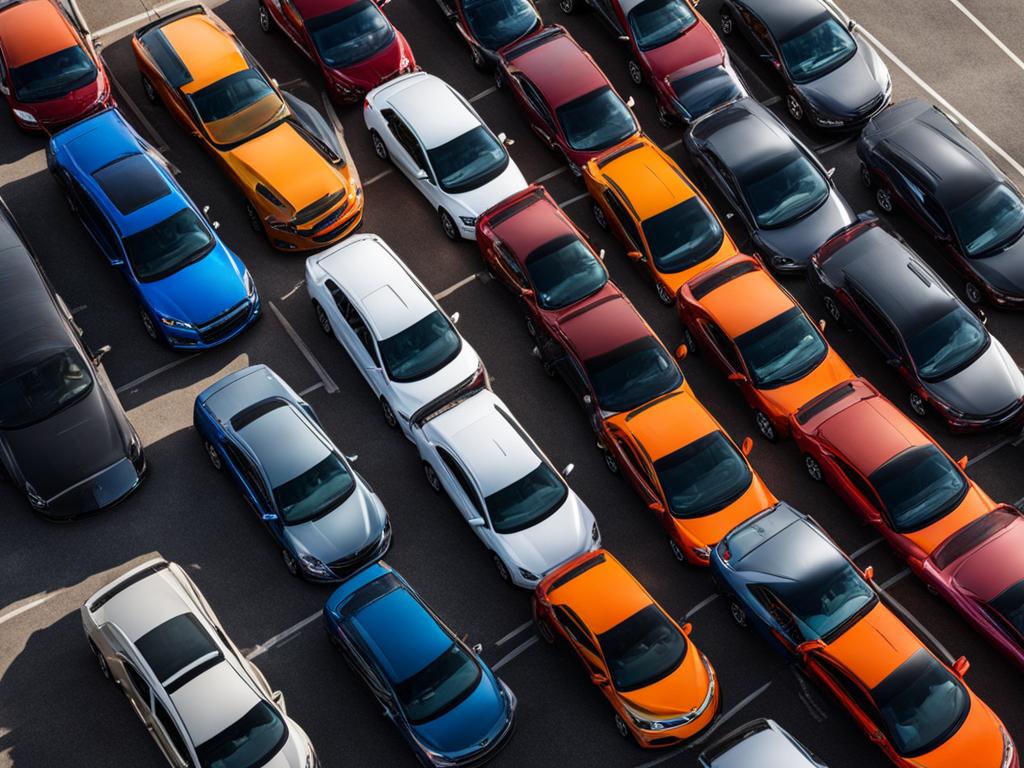
Cost for Different Types of Window Tint
When it comes to window tinting, the cost can vary depending on the type of film you choose. Here is a breakdown of the costs for different types of window tint:
Ceramic Window Tint
Ceramic window tint is known for its exceptional quality and performance. It offers superior heat rejection, UV protection, and clarity. The cost of ceramic window tint can range from $350 to $850, depending on the size of your vehicle and the number of windows being tinted.
Dyed Window Tint
Dyed window tint is the most budget-friendly option available. While it may not have the same level of heat rejection as ceramic or carbon tint, it still provides basic protection against UV rays. The cost of dyed window tint typically falls between $99 and $350, depending on the vehicle size and the number of windows being tinted.
Carbon Window Tint
Carbon window tint offers a balance between performance and affordability. It provides good heat rejection, UV protection, and a sleek appearance. The cost of carbon window tint usually ranges from $150 to $450, depending on the size of your vehicle and the number of windows being tinted.
It’s important to consider your needs and budget when choosing the type of window tint for your vehicle. While ceramic tint may have a higher upfront cost, its long-term benefits make it worth considering. On the other hand, if you’re on a tight budget, dyed or carbon tint can still offer adequate protection and privacy.
To visualize the cost differences between these types of window tint, here is a table summarizing their price ranges:
| Type of Window Tint | Cost Range |
|---|---|
| Ceramic Window Tint | $350 – $850 |
| Dyed Window Tint | $99 – $350 |
| Carbon Window Tint | $150 – $450 |
Tailoring your choice to your specific needs and budget will help you find the ideal window tint that suits your vehicle and preferences.
Other Factors Affecting Window Tint Cost
While the type of tint and the vehicle type are crucial factors in determining window tinting costs, several other considerations can also impact the overall price. It’s essential to understand these additional factors to make an informed decision about your window tinting options.
Number and Complexity of Windows
The number and complexity of windows on your vehicle play a significant role in determining the cost of window tinting. Different vehicles have varying window configurations, including rear windshields, quarter windows, and sunroof windows. The more windows you have, the more tinting material and labor are required, which can result in higher costs.
Tint Warranty
The warranty provided with your chosen window tint is another important factor to consider. A tint warranty ensures that the film will maintain its performance and appearance over time. High-quality tints often come with longer warranties, providing peace of mind and protection for your investment.
Location and Local Tint Laws
The location where you reside and the local tint laws can also influence the cost of window tinting. Different states and municipalities have their own regulations regarding the visible light transmission (VLT) percentage allowed on windows. Compliance with these laws may require the use of specific tint films or limit the darkness of the tint, which can affect the pricing.
DIY Window Tinting
One option to consider for cost-conscious individuals is do-it-yourself (DIY) window tinting. DIY kits are available for those who are confident in their ability to apply the tint correctly. While DIY tinting can save money on labor costs, it is important to remember that proper installation requires skill and patience. Mistakes can lead to unsightly bubbles or uneven tints, which may result in additional expenses to correct or remove the tint.
By considering these additional factors, you can better understand and navigate the cost of window tinting to make an informed decision that suits your budget and needs.
Factors Affecting Window Tint Cost
| Factors | Impact on Cost |
|---|---|
| Number and Complexity of Windows | Increase in cost with more windows and complex shapes |
| Tint Warranty | Higher-quality tints may come with longer warranties |
| Location and Local Tint Laws | Compliance with tint laws may require specific films or limit darkness |
| DIY Window Tinting | Potential savings on labor costs, but risk of improper installation |
Window Tinting Costs for Tesla Vehicles
Tinting your Tesla vehicle’s windows not only adds a touch of style but also provides practical benefits such as UV protection and increased privacy. The cost of window tinting for Tesla models can vary depending on the specific vehicle and the number of windows being tinted. Let’s explore the average costs for different Tesla models and all-around tint options.
Tesla Model 3 Window Tinting Costs
When it comes to tinting the windows of your Tesla Model 3, the price can range from $250 to $935 for all-around tinting, which includes the sides, rear, and front windshield. Keep in mind that additional costs may apply for features like the large rear windshield, so make sure to consult with a reputable tint installer for an accurate quote.
Tesla Model X Window Tinting Costs
Tinting the windows of a Tesla Model X can also range from $250 to $935 for all-around tinted windows. The panoramic roof of the Model X may require additional attention, affecting the overall cost. It’s always wise to discuss the specific requirements of your Model X with a professional tint installer to get an accurate estimate.
Tesla Model Y Window Tinting Costs
For those who own a Tesla Model Y, the price of window tinting can fall within the same range as the Model 3 and Model X. Depending on your preferences and the number of windows being tinted, you can expect to pay between $250 and $935 for all-around tinting. Be sure to inquire about any extra costs that might apply to certain features of the Model Y.
To give you a better idea of the average costs, refer to the table below for a side-by-side comparison of window tinting costs for Tesla vehicles:
| Tesla Model | All-Around Tinting Cost (Range) |
|---|---|
| Tesla Model 3 | $250 – $935 |
| Tesla Model X | $250 – $935 |
| Tesla Model Y | $250 – $935 |
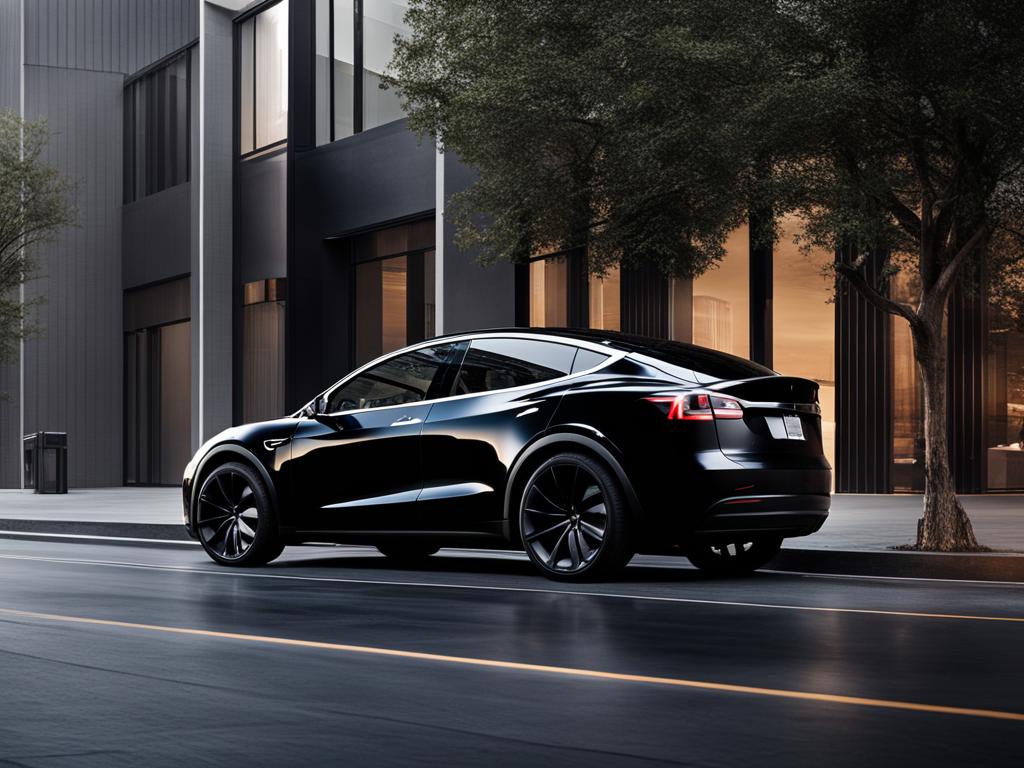
Remember that these costs are estimates and can vary depending on factors such as your location, the tint shop you choose, and any additional features or customization you may require. It’s always a good idea to consult with several reputable tint installers to get accurate quotes and consider their expertise and customer reviews before making a decision.
Benefits of Ceramic Window Tint
Ceramic window tint offers numerous benefits, making it a popular choice for car owners. This type of tint utilizes advanced technology, providing enhanced performance and durability compared to other options. Its ability to block infrared (IR) rays and reject heat ensures a comfortable driving experience while protecting against harmful UV radiation.
Here are some key benefits of ceramic window tint:
- Advanced Technology: Ceramic window tint incorporates advanced materials and manufacturing techniques, resulting in superior performance and longevity. Its innovative design allows for optimal heat rejection and infrared blocking, reducing interior temperature and enhancing energy efficiency.
- Effective IR Blocking: Ceramic window tint effectively blocks infrared radiation, which is responsible for the majority of heat buildup inside a car. By minimizing IR rays, it helps keep the interior cooler and more comfortable, reducing the need for excessive air conditioning and improving fuel efficiency.
- Enhanced Durability: Thanks to its construction, ceramic window tint is highly durable and resistant to fading, discoloration, and bubbling. It can withstand prolonged exposure to sunlight and harsh weather conditions, ensuring a long-lasting and visually appealing tint that maintains its performance over time.
- Protection Against UV Rays: Ceramic window tint provides excellent protection against harmful ultraviolet (UV) rays, which can cause skin damage and fading of your car’s interior. By blocking up to 99% of UV rays, it helps safeguard your health and preserve the look and condition of your vehicle’s upholstery.
The benefits offered by ceramic window tint make it an attractive choice for car owners seeking top-quality and long-lasting window tint solutions.
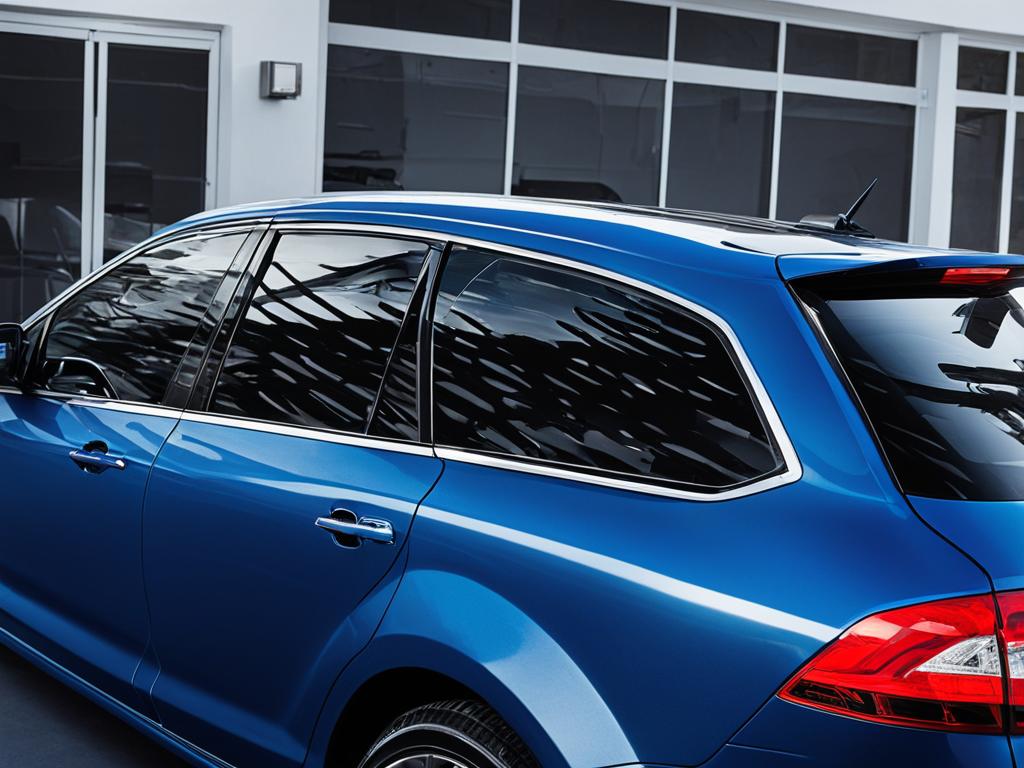
Expert Quote:
“Ceramic window tint is a game-changer in the world of automotive window films. Its advanced technology, superior heat rejection, and UV protection make it an excellent investment for car owners.” – John Smith, Automotive Window Tinting Expert
Benefits of Dyed Window Tint
When it comes to window tint options, dyed window tint stands out as an affordable choice for those on a budget. While it may not offer the same longevity as other types of tint, it provides several benefits that make it an attractive option for many car owners.
Affordability
The primary advantage of dyed window tint is its affordability. Compared to other types of tint, such as ceramic or carbon, dyed tint is typically more budget-friendly. This makes it an excellent option for individuals looking to enhance their car’s aesthetics and privacy without breaking the bank.
Easy Installation
Another benefit of dyed window tint is its ease of installation. With its simple application process, dyed tint can be easily installed by both professionals and DIY enthusiasts. This not only saves time and effort but also reduces the cost associated with professional installation.
Furthermore, the straightforward installation process minimizes the risk of errors or complications, ensuring a smooth and efficient tinting job. Whether you choose to install it yourself or hire a professional, dyed window tint offers a hassle-free tinting experience.
Dyed window tint is an affordable and easy-to-install option for car owners who want basic UV protection and increased privacy without breaking the bank.
While dyed window tint may not offer advanced features like heat rejection or infrared light blocking, it still provides basic protection against harmful UV rays. This can help protect your car’s interior from fading, cracking, and damage caused by prolonged sun exposure.
Additionally, dyed window tint enhances privacy by reducing the visibility into your vehicle. It creates a sleek, dark appearance that keeps prying eyes at bay without compromising your ability to see clearly from inside the car.
Although dyed window tint may not have the same level of performance or durability as other types of tint, it remains a popular choice due to its affordability and easy installation process. Whether you’re a budget-conscious car owner or simply prefer a more straightforward tinting solution, dyed window tint offers a practical and cost-effective option to enhance your driving experience.
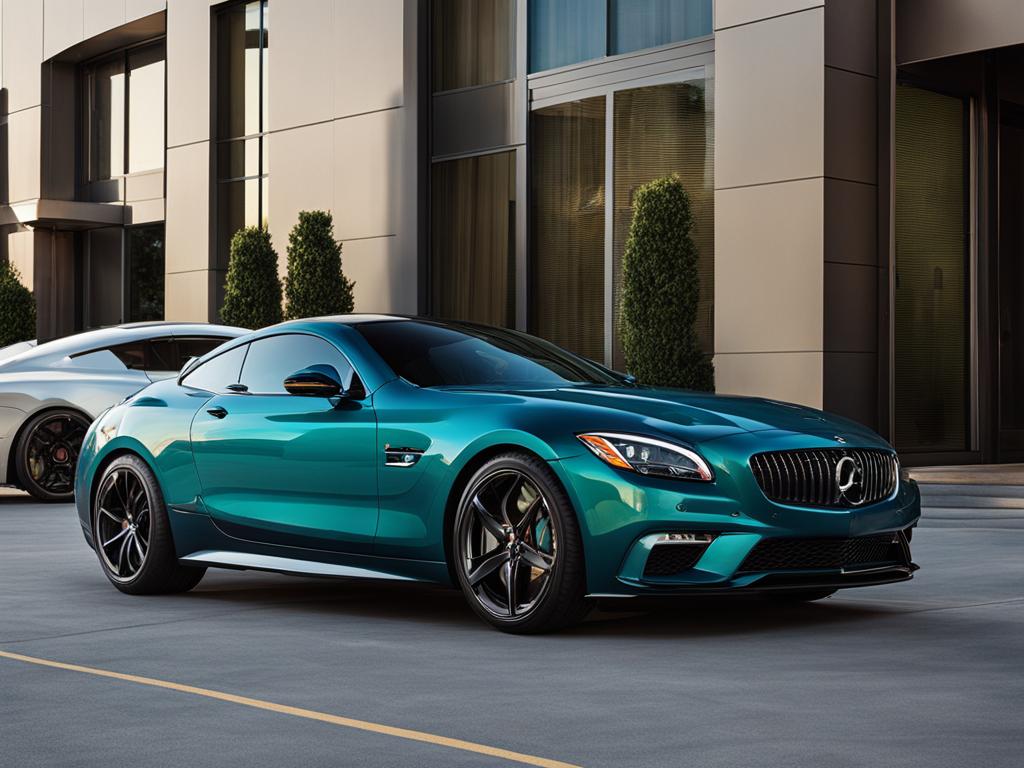
Benefits of Carbon Window Tint
When it comes to window tinting for your vehicle, carbon window tint offers numerous advantages that can enhance your driving experience. From effectively blocking infrared light to keeping the interiors cooler, carbon window tint strikes a balance between affordability and performance.
Effective Infrared Light Blocking: One of the key benefits of carbon window tint is its ability to block infrared (IR) light. IR light is responsible for the heat buildup inside your car, making it uncomfortable during hot weather. By blocking a significant amount of IR rays, carbon window tint helps to keep the interior of your vehicle cooler, allowing for a more comfortable ride.
Cooler Interiors: The infrared light-blocking properties of carbon window tint contribute to cooler interiors by reducing the amount of heat that enters your vehicle. This can alleviate the need to blast the air conditioning system at full capacity, leading to potential fuel savings and increased comfort for both drivers and passengers.
Furthermore, carbon window tint provides additional benefits such as:
- Protection against harmful UV rays
- Enhanced privacy
- Reduced glare
- Preservation of the vehicle’s interior by preventing fading and cracking of upholstery
Tinting your car windows with carbon window tint offers an array of advantages, including effective infrared light blocking and cooler interiors. This mid-range tinting option strikes a balance between affordability and performance, making it an excellent choice for many vehicle owners.
| Benefits of Carbon Window Tint |
|---|
| Infrared light blocking |
| Cooler interiors |
| Protection against UV rays |
| Enhanced privacy |
| Reduced glare |
| Preservation of vehicle’s interior |
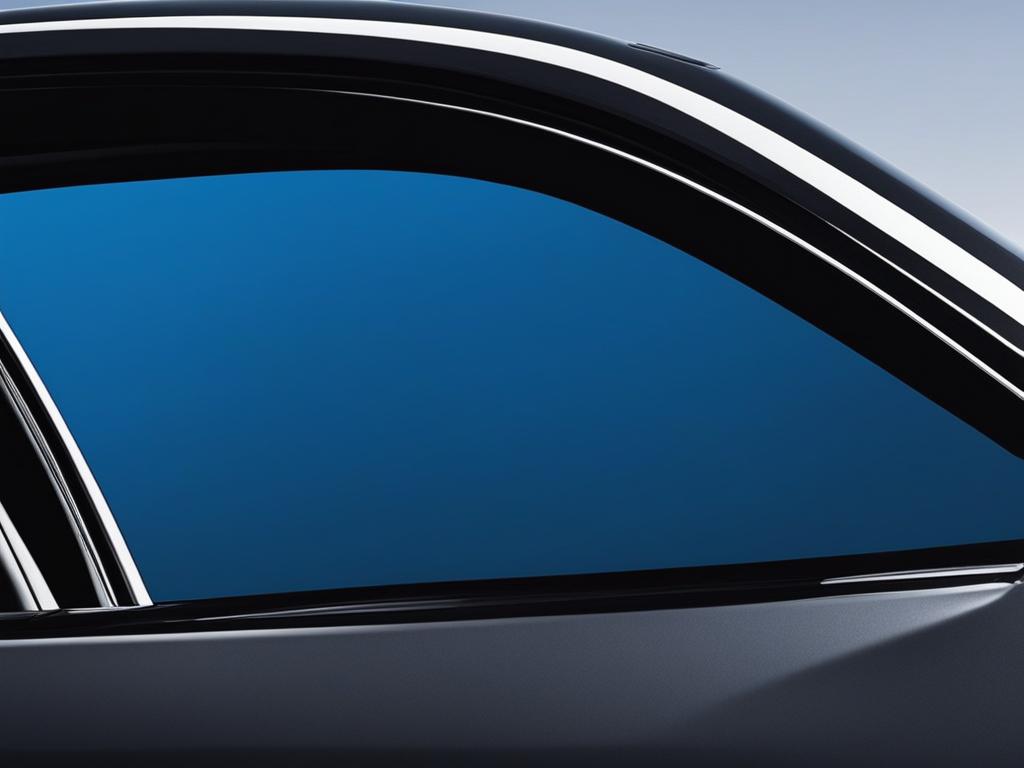
Choosing the Right Window Tint Installer
When it comes to window tinting for your car, selecting the right installer is crucial to ensure a high-quality and long-lasting result. Several factors should be considered before making your decision, including the installer’s experience, certifications, and customer reviews.
Experience: One of the primary factors to consider is the installer’s experience. An experienced window tint installer will have the necessary knowledge and skills to handle the tinting process efficiently. They will be familiar with various window types and vehicles, ensuring a precise and professional installation.
Certifications: Look for an installer who holds relevant certifications in window tinting. Certifications indicate that the installer has undergone specialized training and meets industry standards. It is a sign of their commitment to professionalism and expertise.
Reviews: Reading customer reviews and testimonials can provide valuable insights into the quality of work done by a window tint installer. Look for reviews that highlight the installer’s attention to detail, customer satisfaction, and overall experience. Positive reviews are an indication of a reputable installer who consistently delivers excellent results.
Choosing a reputable window tint installer ensures that the tint is installed correctly, avoiding issues such as bubbles, peeling, or poor adhesion. This not only enhances the appearance of your car but also provides long-term satisfaction and peace of mind.
Consider these factors carefully when selecting a window tint installer for your car. By choosing an experienced professional with the right certifications and positive reviews, you can trust that your window tinting job will be handled with care and precision.
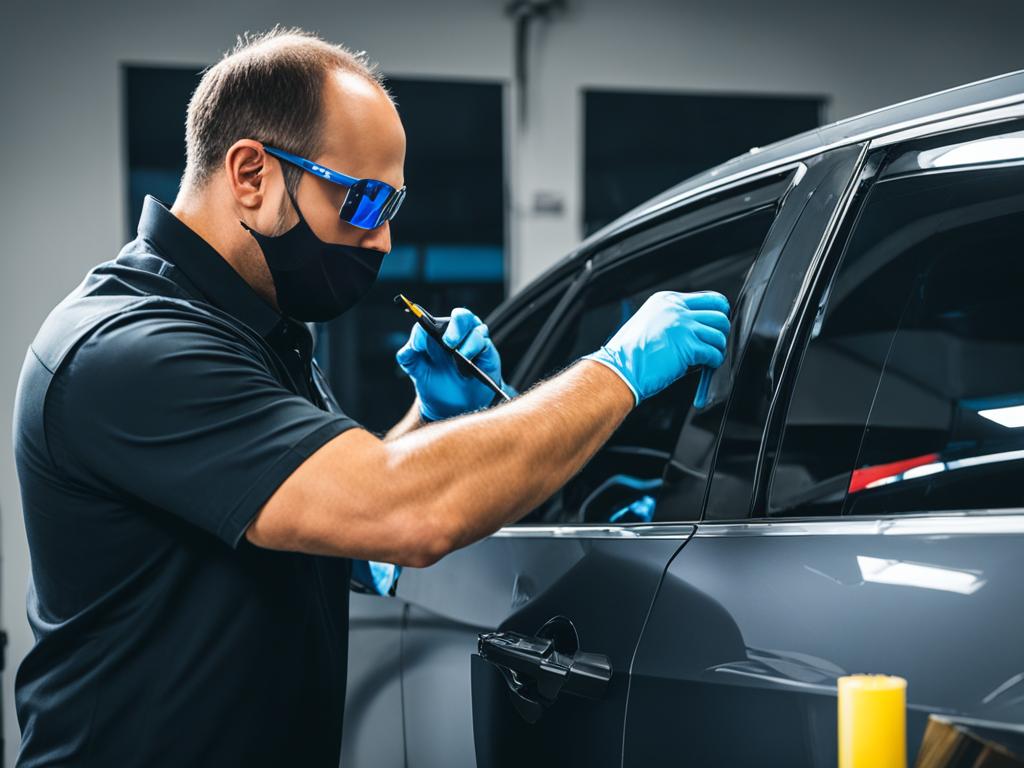
Pros and Cons of DIY Window Tinting
While DIY window tinting can offer cost savings, it is essential to weigh the pros and cons before embarking on this project. One of the primary advantages of opting for DIY tinting is the potential for reducing expenses compared to professional installation. By purchasing a window tinting kit and doing the installation yourself, you can save money on labor costs.
However, lack of expertise in window tinting can lead to potential drawbacks. Without proper knowledge and experience, there is a risk of incorrect installation, which can result in issues such as bubbling and peeling of the tint film over time. These problems may require reapplication or even professional correction, which can add to the overall cost and hassle.
It’s important to consider your own skill level and the complexity of the tinting job. While some individuals may have the necessary expertise and confidence to achieve satisfactory results, others may find it challenging to achieve a professional finish.
In some cases, local laws and regulations may also restrict the type and darkness of window tint that can be applied. Violating these regulations can lead to penalties or fines, highlighting the importance of understanding the legal requirements in your region before attempting a DIY tinting project.
“DIY window tinting can save money upfront, but improper installation can lead to costly problems.”
In summary, DIY window tinting can be a cost-saving option, especially for those with the necessary skills and knowledge. However, the lack of expertise and the potential for incorrect installation should be taken into consideration. It is important to weigh the pros and cons and consider the potential risks and consequences before deciding to proceed with DIY window tinting.
Conclusion
Window tinting offers numerous benefits and can greatly enhance your driving experience. However, it’s crucial to consider the cost of tinting car windows and the various factors that influence pricing. The average cost of window tinting ranges from $100 to $1,000, depending on factors such as the type of tint material, the number of windows being tinted, and additional warranties.
One of the key reasons why many people choose to tint their car windows is for the protection it provides. Window tinting effectively blocks harmful UV rays, which can minimize the risk of skin cancer and protect the interior of your vehicle from fading and cracking due to sun exposure. Tinted windows also offer increased privacy, as they make it more difficult for people to see into your vehicle.
When considering window tinting, it’s essential to choose a reputable installer. Experienced installers will ensure a high-quality finish and provide warranty coverage for both the product and the installation. Additionally, factors such as the type of vehicle, the size and complexity of windows, and the brand of tint material can affect the overall cost of the service.
In conclusion, window tinting is a worthwhile investment that offers a range of benefits. By understanding the cost of tinting car windows and the factors that influence pricing, individuals can make informed decisions and enjoy the advantages of tinted windows including UV protection, interior preservation, safety, privacy, and enhanced comfort.
FAQ
How much does it cost to tint car windows?
The average cost of window tinting can range from $100 to $1,000, depending on various factors such as the type of tint, warranties, and the number of windows being tinted.
What factors affect the cost of window tinting?
The cost of window tinting is influenced by several factors, including the type of vehicle, the number of windows, tint removal if necessary, type of tint material, installer experience, overhead expenses of the tint shop, and the brand of tint used.
How much does it cost to tint car windows for different vehicle types?
The cost of tinting car windows can vary based on the type of vehicle. For coupes, prices can start at $69 for a single window and go up to $389 for all sides and rear package + front windshield. Sedans may range from $125 for front two windows to $465 for all sides and rear package + front windshield. Trucks can cost between $185 and $425 depending on the type of cab. SUVs may range from $329 to $489 for all sides and rear package + front windshield. Tinting a Tesla can vary depending on the model and the number of windows to be tinted.
Why is it important to choose a reputable window tint installer?
When getting your car windows tinted, it is crucial to choose a reputable installer to ensure a high-quality finish. Factors to consider include the installer’s experience and reputation, certifications they have for the specific tint, and the warranty provided for the tint. A reputable installer will have the necessary expertise and knowledge to handle the tint properly and offer a warranty for both the product and workmanship.
What other factors can affect the cost of window tinting?
Several factors can affect the pricing of window tint, including the quality of tint material used, the size of the vehicle and number of windows, the brand of film chosen, the shop’s overhead expenses, and the uniqueness of the vehicle.
What are the average window tinting prices for different car types?
The average cost of window tinting can vary based on the type of car. For coupes, prices may range from $120 to $450. Sedans can cost between $225 and $465. Trucks may range from $200 to $425. SUVs can cost between $250 and $750. Tinting a Tesla can vary with prices ranging from $250 to $935.
How much does each type of window tint cost?
The cost of window tinting can vary based on the type of film used. Ceramic window tint is the highest quality and can cost between $350 and $850. Dyed window tint is the most affordable option, ranging from $99 to $350. Carbon window tint falls in between and can cost between $150 and $450.
What are the other factors affecting window tint cost?
In addition to the type of tint and the vehicle type, other factors can affect the cost of window tinting. These include the number and complexity of windows, the warranty provided with the tint, the location and local tint laws, and the option of doing it yourself with a DIY tinting kit.
How much does window tinting cost for Tesla vehicles?
Tinting a Tesla vehicle can vary in cost depending on the specific model and the number of windows being tinted. Prices for all-around tint can range from $250 to $935, with additional costs for specific features such as the large rear windshield of the Model 3 or the panoramic roof of the Model X.
What are the benefits of ceramic window tint?
Ceramic window tint offers several benefits, including advanced technology, effective IR blocking, and increased durability compared to other types of tint. It provides heat rejection and enhanced visibility while protecting against harmful UV rays.
What are the benefits of dyed window tint?
Dyed window tint is an affordable option for those on a budget. While it may not have the same longevity as other types of tint, it is easy to install and provides basic protection against UV rays.
What are the benefits of carbon window tint?
Carbon window tint offers benefits such as effective blocking of infrared light and keeping vehicle interiors cooler. It is a mid-range option that provides a balance between affordability and performance.
What factors should I consider when choosing a window tint installer?
When selecting a window tint installer, it is important to consider factors such as their experience, certifications, and customer reviews. Choosing a reputable installer ensures that the tint is installed correctly and provides long-term satisfaction.
What are the pros and cons of DIY window tinting?
DIY window tinting can be a cost-saving option, but it comes with potential drawbacks. Lack of expertise and the risk of incorrect installation can lead to bubbling and peeling, requiring reapplication or professional correction.




